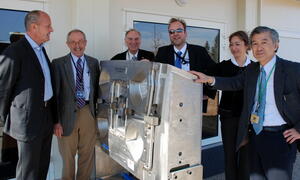The challenge of export control
As a nuclear installation, the control of sensitive information at ITER is an important issue. A steady flow of information about technology and materials is exchanged between the ITER Organization and the Domestic Agencies—be it by Blackberry, computer, on paper, or in conversation. Control of this information is the task of the Export Control Working Group, established by the ITER Council at its second meeting in June 2008. Michael Roberts from the United States was nominated and appointed as the Group Chair. He has been involved in the ITER Project since its conception.
Last week, Dr. Roberts met with ITER Organization staff closely involved with export control in preparation for the Working Group's next meeting in Washington in early April. Together, they also participated in the first export control awareness training for ITER Organization staff. Thirty people from the ITER Organization participated in this training. "The aim of the working meetings was twofold," reported Michael. "The first aim was to look at the progress being made by the ITER Organization on export control in anticipation of the upcoming Washington meeting, and to give a sharper focus to those preparatory efforts."
The second aim was to begin the process of creating awareness about export control. How should the issue be managed within the ITER Organization in terms of culture, awareness, attitude and level of concern? "We need to understand how we identify and handle sensitive items of information, technology, and equipment that the Members will be providing to the ITER Organization as part of their Procurement Arrangements. Each Member has its own export control regulators," Roberts said. "We're looking at a great challenge. The lively discussions we have had over these past three days have shown that we are on the right track in understanding how to deal effectively with this challenge."


